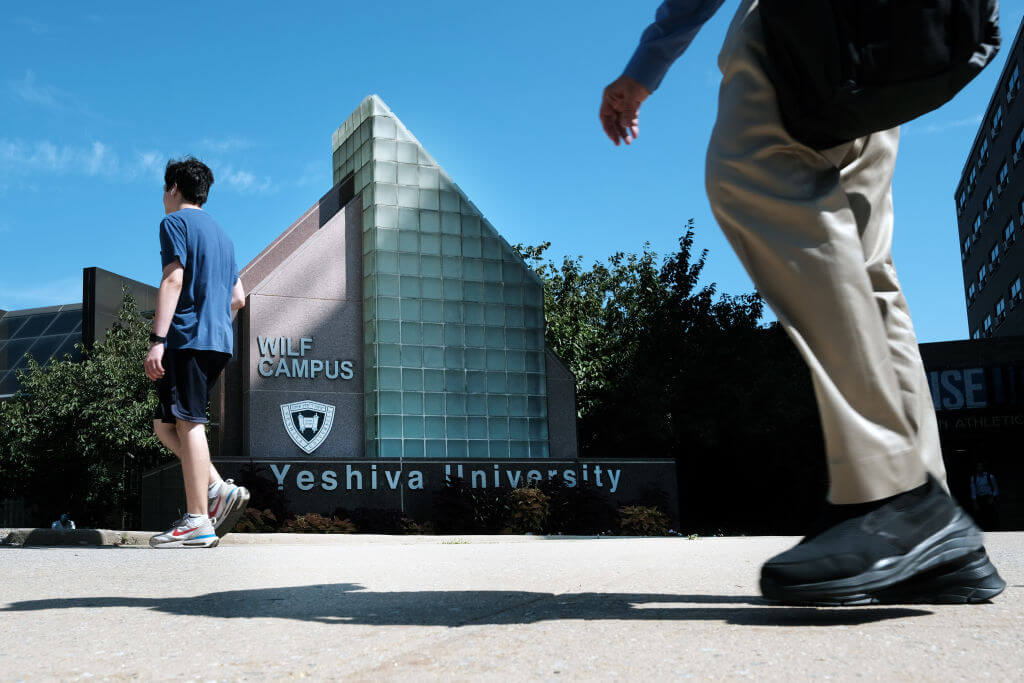As Pride club takes on Yeshiva University, LGBTQ students at other religious colleges take notice
Two other LGBTQ discrimination lawsuits are moving through the courts

The campus of Yeshiva University in New York City. Photo by Spencer Platt/Getty Images
Yeshiva University’s decision to suspend all student activities rather than recognize a campus Pride group surprised many in the Jewish world. In Provo, Utah, the move sounded familiar.
Brigham Young University, which follows the religious law of The Church of Jesus Christ of Latter-day Saints, has strict rules against same-sex relationships, and has gone to considerable lengths to enforce them.
“I’m like, ‘This is literally BYU,’” David Shill, a senior at Brigham Young University, said in an interview. “It’s the exact same antics and stunts that BYU would do.”
Shill runs the Cougar Pride Center, an organization that supports the school’s LGBTQ students. Like the YU Pride Alliance, whose effort to gain recognition from YU is still playing out in court, the Cougar Pride Center is not officially recognized by the university, meaning it won’t receive funding and can’t meet on campus. Another BYU pride group has its application rejected each year; Shill does not bother trying.
If anyone can identify with the struggle for LGBTQ equality at the Orthodox Jewish university, it is people like Shill: queer college students waging similar battles at other religious universities. They, too, describe old-guard administrators who may prevail in the courts, but who nevertheless seem to be on the defensive as queer people demand equal treatment. And as YU’s case develops in the national spotlight, they are feeling personally and legally invested in the outcome.
Not content to merely track the case from afar, Shill has also reached out to the Pride Alliance to offer moral support.
“It’s hard for people who haven’t been through it to really understand how crushing a homophobic action can be from a university and how othering and how clearly they put you in this box,” Shill said. “They remind you that you’re a minority, that your identity is against God. I think for people who haven’t been through that, it’s just really hard — you feel so small.”
The legal stakes
Yeshiva University’s queer students aren’t the only ones fighting back. Students and alumni from dozens of religious universities are suing the Department of Education for noncompliance with Title IX, the federal civil rights law that prohibits sex-based discrimination in schools that receive federal funding. In another lawsuit, students and faculty at Seattle Pacific University are suing the school’s board of trustees following an internal revolt that began when an adjunct professor was denied a permanent position allegedly because he was gay.
Not that queer students at any two religious universities are necessarily treated the same. Brigham Young’s regime is harsher than Yeshiva’s: Same-sex couples can’t hold hands on BYU’s campus for fear of expulsion.
On the other hand, Chloe Guillot, a Seattle Pacific graduate student who is among the plaintiffs in its suit against the board, said she appreciated her relative privilege compared to other religious schools. Seattle Pacific, which is associated with the evangelical Free Methodist Church, recognized its student Pride organization more than a decade ago, and has no rules that restrict students’ gender or sexual expression.
Reading details of the YU case, Guillot said, “was kind of like a gut check of, ‘Man, we’ve come so far at SPU, and I hope the other colleges can come that far as well.’”
Like Shill, though, she recognized the defiance of Yeshiva University administrators holding the line against full LGBTQ acceptance, calling the student activities ban a “political stunt.” At Seattle Pacific, mass resignations from the board followed widespread protests against the school’s hiring policy.
The remaining trustees dug in their heels. After the Washington state attorney general announced an investigation into the school, Seattle Pacific sued the state in an attempt to block it — retaining Becket Law, the same firm representing Yeshiva University against the Pride Alliance.
Paul Southwick, whose firm, the Religious Exemption Accountability Project, is representing the plaintiffs against Seattle Pacific, said the lawsuits reveal a generational divide in American organized religion that is coming to a head at the universities.
“The students who are uprising, they are not outsiders,” Southwick said. “They’re not a bunch of secular atheists. They are very much dedicated to their faith.”
Southwick also filed the suit by 40 religious university students and alumni against the Department of Education.
In that case, the plaintiffs claim that allowing schools with religious exemptions to discriminate against LGBTQ students violates Title IX. (YU has not applied for a religious exemption to Title IX.)
A New York trial court judge ruled in June that YU’s refusal to recognize the Pride Alliance violated the city’s Human Rights Law. The school maintains that requiring it to recognize the group infringed on its religious freedom. Its petition to the Supreme Court for a stay on the judge’s order was denied by a 5-4 vote, but the Court may still take the case down the road.
A favorable Supreme Court ruling for YU Pride Alliance on First Amendment issues would help the plaintiffs, who are awaiting a ruling from a federal judge in Oregon. On the other hand, a ruling in favor of YU could doom their effort.
Regardless of outcome, Southwick said the cases themselves — whether YU Pride Alliance’s or his clients’ — have been fulfilling a consumer protection role for future college students.
“At least now parents and students can know what these schools are doing to their kids,” he said, “and they can make a better informed decision about whether it’s a safe place or not to send their children.”























